
Clan MacNeil, also known in Scotland as Clan Niall, is a highland Scottish clan of Irish origin. According to their early genealogies and some sources they're descended from Eógan mac Néill and Niall of the Nine Hostages. The clan is particularly associated with the Outer Hebridean island of Barra. The early history of Clan MacNeil is obscure. However, despite this the clan claims to descend from the legendary Irish King Niall of the Nine Hostages, who is counted as the 1st Clan Chief, the current Clan Chief being the 47th. The clan itself takes its name from a Niall who lived in the 13th or early 14th century and who belonged to the same dynastic family of Cowal and Knapdale as the ancestors of the Lamonts, MacEwens of Otter, Maclachlans, and the MacSweens. While the clan is centred in Barra in the Outer Hebrides, there is a branch of the clan in Argyll (McNeill/MacNeill) that some historians have speculated was more senior in line, or possibly even unrelated. However, according to Scots law, the current chief of Clan MacNeil is the chief of all MacNeil(l)s.

Clan MacNeacail, sometimes known as Clan MacNicol, is a Scottish clan long associated with the Isle of Skye. Tradition states that, early in its history, the clan held the Isle of Lewis, as well as extensive territory on the north-western mainland. The earliest member of the clan on record is one 14th century John "mak Nakyl", who is recorded amongst Edward I of England's powerful West Highland supporters during the Wars of Scottish Independence. John Barbour's 1375 epic, The Brus, suggests that by 1316, the clan had switched allegiance to Robert I, and made a decisive intervention in the new theatre of Anglo-Scottish conflict in Ireland. The marriage of an heiress to the MacLeods of Lewis brought a severe loss of lands and power in the following generation, forcing the clan chiefs to relocate to the surviving estates on Skye. However, the MacNeacails retained local significant influence: serving, according to tradition, as members of the Council of the Lords of the Isles and as custodians of the cathedral church of the Western Isles at Snizort. In the 17th century, members of the clan began to Anglicise their surname from the Scottish Gaelic MacNeacail to various forms, such as Nicolson. Today the English variants of the Gaelic surname are borne by members of the clan as well as members of unrelated Scottish families, including the Lowland Clan Nicolson.

Clan Cameron is a West Highland Scottish clan, with one main branch Lochiel, and numerous cadet branches. The Clan Cameron lands are in Lochaber, and within their lands lies Ben Nevis, the highest mountain in the British Isles. The Chief of the clan is customarily referred to as simply "Lochiel".

Clan Lamont is a Highland Scottish clan. The clan is said to descend from Ánrothán Ua Néill, an Irish prince of the O'Neill dynasty, and through him Niall Noigíallach, High King of Ireland. Clan Ewen of Otter, Clan MacNeil of Barra, Clan Lachlan, and Clan Sweeney are also descendants of Ánrothán. Traditional genealogy would therefore include Clan Lamont among the descendants of Conn Cétchathach.
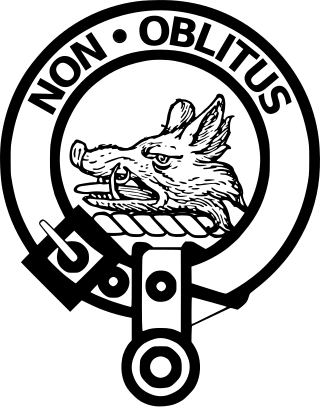
Clan MacTavish is an Ancient Highland Scottish clan with Irish origins.
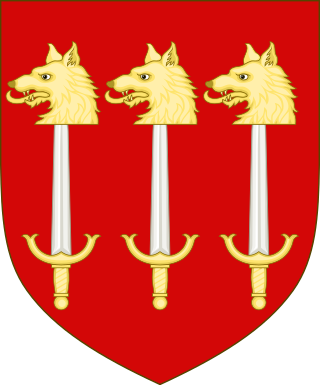
Clan Skene is a Scottish clan.
Clan Straiton, also called Straton or Stratton, is a Lowland Scottish clan. The clan does not currently have a chief therefore it is considered an Armigerous clan.

Clan Macfie is a Highlands Scottish Clan.

Colonel Sir Donald Walter Cameron of Lochiel, was a British Army officer of the Queen's Own Cameron Highlanders and the 25th Chief of Clan Cameron.
Éogan is an early Irish male given name, which also has the hypocoristic and diminutive forms Eoganán, Eóghainin, Eóghain and Eóghainn. The Modern Irish form of the name is Eoghan.

The Battle of Achnashellach was a Scottish clan battle said to have taken place in the year 1505, in the Scottish Highlands at Achnashellach. It was fought by the Clan Cameron against the Clan Mackay and the Clan Munro.

Clan MacEwen or Clan MacEwan is a Scottish clan recorded in the fifteenth century as Clan Ewen of Otter.

The O'Neill dynasty are a lineage of Irish Gaelic origin that held prominent positions and titles in Ireland and elsewhere. As kings of Cenél nEógain, they were historically one of the most prominent family of the Northern Uí Néill, along with the O'Donnell dynasty. Some O'Neills state that their ancestors were kings of Ailech during the Early Middle Ages, as descendants of Niall of the Nine Hostages.

A Scottish crest badge is a heraldic badge worn to show allegiance to an individual or membership in a specific Scottish clan. Crest badges are commonly called "clan crests", but this is a misnomer; there is no such thing as a collective clan crest, just as there is no such thing as a clan coat of arms.
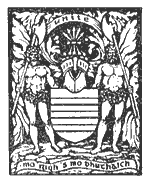
Donald Cameron, known as Black Taylor of the Axe was a famed warrior of the Scottish Highlands during the reign of Mary, Queen of Scots. Born illegitimate, his father was Ewen Cameron of Lochiel, 14th chief of Clan Cameron, and his mother was the daughter of the chief of Clan MacDougall. Donald Cameron is claimed as the eponymous ancestor of the Taylor sept of Clan Cameron. He is alluded to in the coat of arms of the chief of Clan Cameron, as a likeness of him appears as the supporters holding a Lochaber axe.

A slogan is used in Scottish heraldry as a heraldic motto or a secondary motto. It usually appears above the crest on a coat of arms, though sometimes it appears as a secondary motto beneath the shield. The word slogan dates from 1513. It is a variant of the earlier slogorn, which was an Anglicisation of the Scottish Gaelic sluagh-ghairm. In other regions it is called a war-cry.
Clan Ewen of Otter, was a Scottish clan which once controlled the area around Kilfinan on the Cowal peninsula in Argyll.
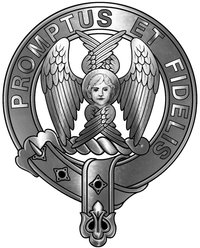
Carruthers, a Scottish Lowland clan and family from Annandale in Dumfriesshire.
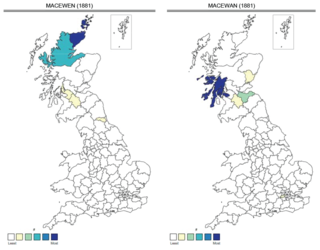
The Scottish surname MacEwen derives from the Old Gaelic Mac Eoghainn, meaning 'the son of Eoghann'. The name is found today in both Scotland and Northern Ireland. Because it was widely used before its spelling was standardised, the modern name has several common variations.
















